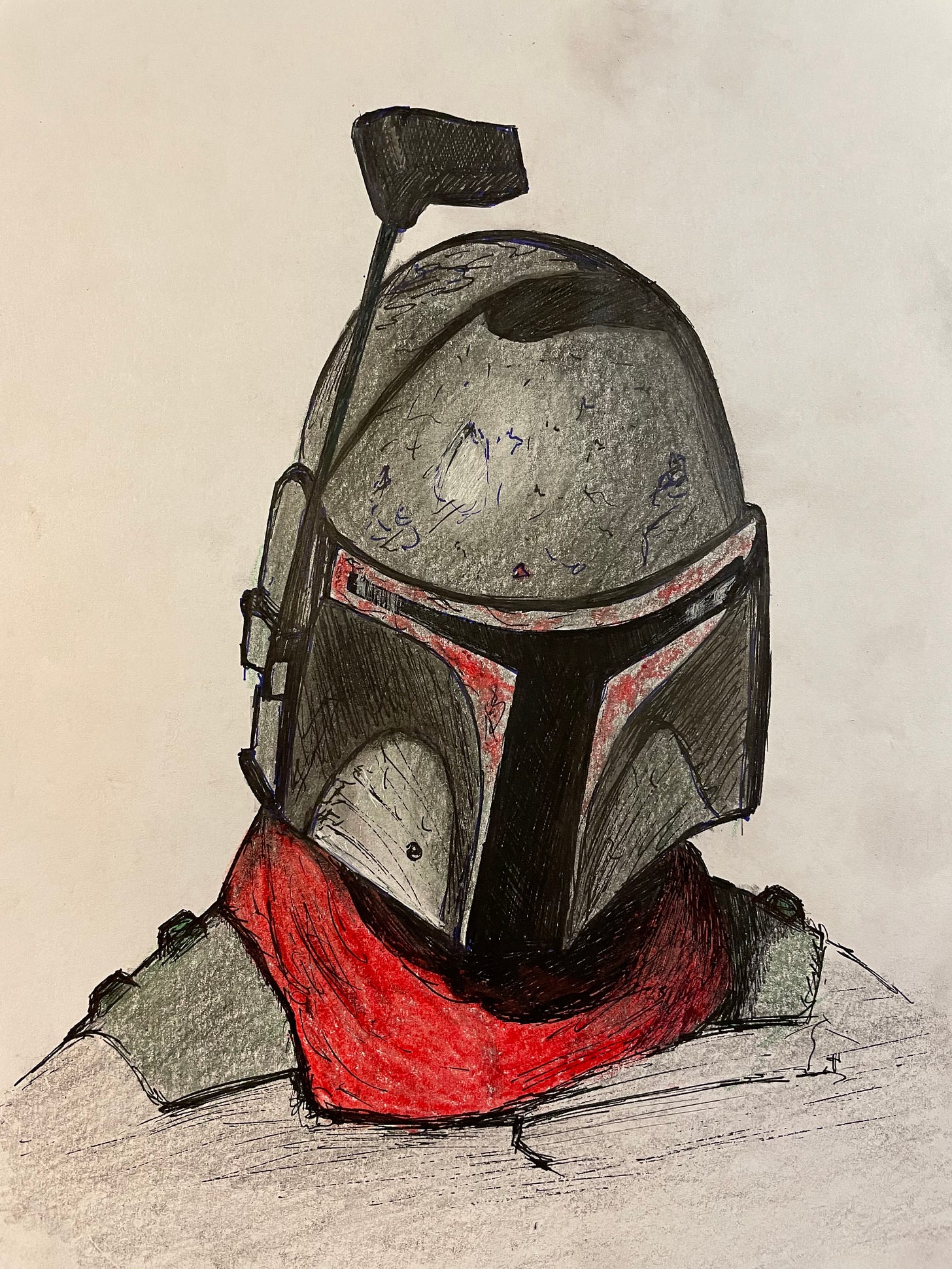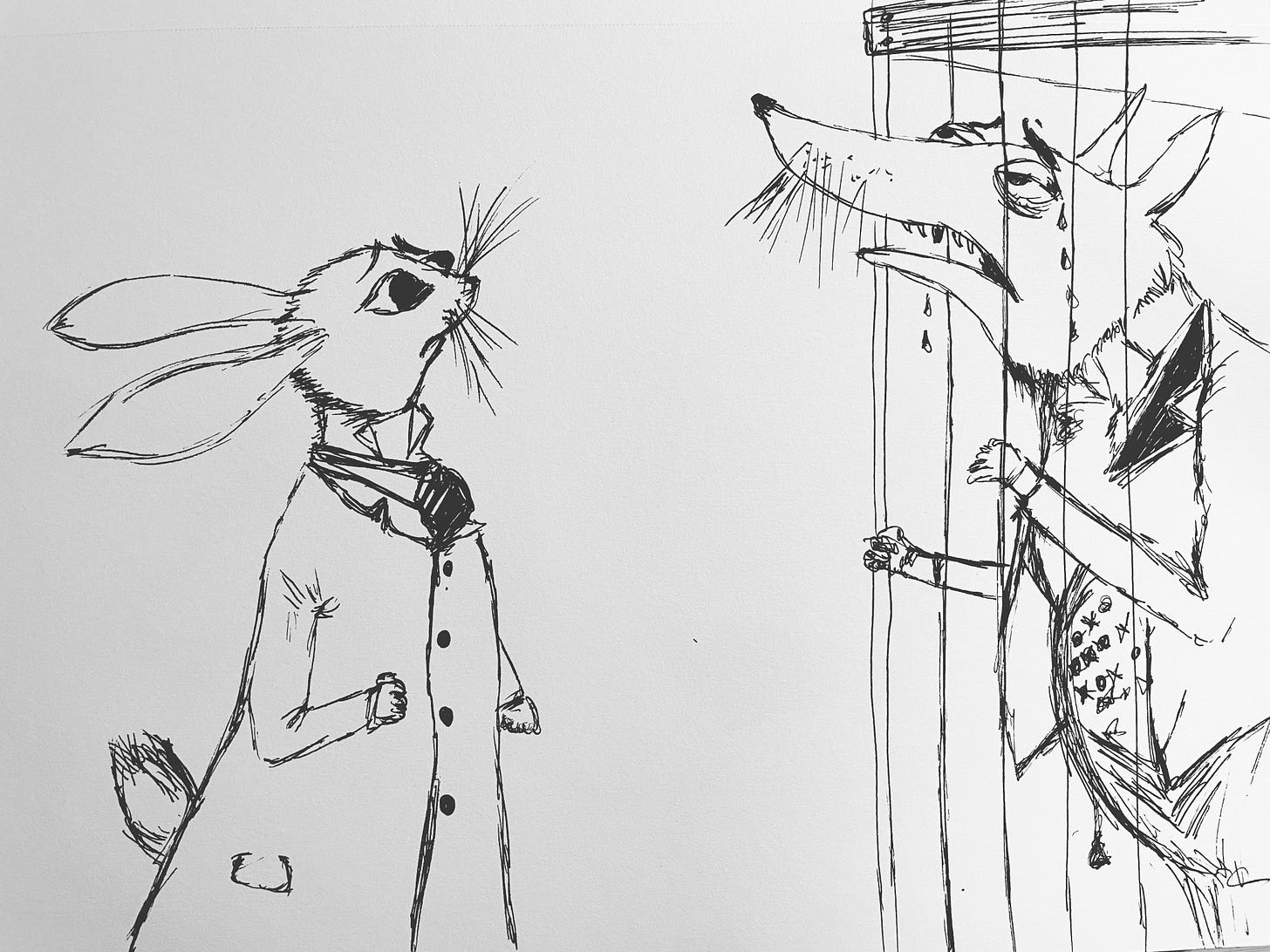🦊 The Best Books I Read in 2020
QBF #43 — My favorite books of the year, a tale about a little fish, and sketching Boba Fett.
Hey friends,
I hope you’re doing well, staying safe, and taking some time to relax over these holidays. In today’s edition, I’m sharing some of my favorite books I’ve read this year.
I was lucky to find books that helped me flourish creatively, and others that taught me how to cope with these tough times. There’s lots to take away from these wonderful books, and I hope this list helps you find your next read! I’m always open to recommendations, so if you know of a book you think I’d love, feel free to reply and let me know! I’d love to hear from you.
If you prefer, you can read this post on my blog.
Favorite Books of 2020
Non-Fiction
Big Magic by Liz Gilbert
I had high expectations for this book, and somehow it still exceeded them. Gilbert’s ideas on creativity and her focus on empathy and self-compassion has really changed the way I think about creative work. My essay Why Bother? explores the purpose of sharing our work, and how keeping our talents within us is a form of pain. These ideas were directly inspired by Gilbert’s ideas shared in this book.
Gilbert has become a personal inspiration that I look toward whenever I hit creative blocks.
Self Reliance by Ralph Waldo Emerson
This book was written in 1908, and continues to be a source of wisdom today. In a world where we’re constantly surrounded by the noise of our peers (on our phones, our laptops, our TVs), it has become incredibly important to find space for ourselves.
Even in the isolation of a pandemic, I found that I can spend so much time “being online” that I no longer can hear myself think. Emerson advises on the value of solitude as well as the importance of trusting your own instincts.
We often discount our own wisdom, when it is precisely the advice we should be listening to. There are many quotes from the book I’ve taken to heart, but this one has now found a place on my wall:
A man should learn to detect and watch that gleam of light which flashes across his mind from within, more than the lustre of the firmament of bards and sages. Yet he dismisses without notice his thought, because it is his.
Trust yourself.
Awareness by Anthony De Mello and J. Francis Stroud
This was an incredible read. I had to work through it slowly, as there were so many insights. It’s one of those books I need to re-read to fully absorb. It is packed full of wisdom on the purpose and meaning of life, building self-awareness, and so much more.
De Mello gets straight to the point in each chapter, which makes it a compelling read throughout. I don’t think anyone would regret reading this book. Here’s a quote that stuck with me:
We see people and things not as they are, but as we are.
That is why when two people look at something or someone, you get two different reactions.
The idea behind this is that everything we experience is a projection driven by the nature of ourselves. Thus, if we want to understand our lives (let alone improve them), we must first understand ourselves at a deep level.
Comfortable with Uncertainty by Pema Chödrön
As I struggled to deal with the pandemic and the uncertainty it brought, I looked to this book for guidance, and found it rewarding. The crucial lesson here is that the more we seek stability, the more discomfort we find in our inevitable disappointment. Life is full of choppy waters — we have to find peace in riding the waves.
I shared lessons from the book in my essay, Embracing Uncertainty.
The Science of Storytelling by Will Storr
I read this book to learn about storytelling, and ended up learning a ton about human perception, and the stories we tell ourselves as we live our lives. If you’re a writer, you might enjoy my recent newsletter where I share takeaways from the book on how storytelling teaches us to write.
Even if you’re not interested in the creative advice of the book, I highly recommend reading the first chapter of the book. It is an incredible lesson on the structure of our brain, how we process events, the delusion of reality. It will change the way you think about perception itself.
Rest by Alex Pang
This was an insightful book about the importance of rest in the creative process. Many of its ideas have stuck with me, including Pang’s thoughts on the need to re-evaluate how we think about work in society (he has since released another book proposing a four-day work week). The book is longer than it needs to be, but its ideas are crucial. We cannot take rest for granted. We must prioritize rest not to survive, but to thrive.
I shared a key takeaways from the book in a note in my digital garden.
Bird by Bird by Anne Lamott
This book is packed with lots of great tips on writing that really resonated with me. If you take away only one idea from the book, it should be Lamott’s concept of writing “shitty first drafts”. This is a powerful idea that can be applied to any creative work — we have to get over ourselves in order to get our work out into the wild.
Fiction
I’ve been trying to read more fiction lately, but am still struggling to find long-form fictions books I love. I ended up re-reading two of my favorites — Circe and Song of Achilles by Madeline Miller — and am still looking for more books like it. The fiction I did read leaned toward older books — I’ve found more and more joy and value from reading classics of late.
Candide by Voltaire
This novella was published in January of 1759, and tells the tale of Candide’s life as he navigates significant hardships and trying times. Despite the heavy context of the story, I found it absolutely hilarious. I was pleasantly surprised by the cutting wit in this satire. The writing is fantastic, and there are single lines in the book that forced me to pause and laugh out loud. I would share a couple here, but don’t want to spoil any of the fun for you. I can’t wait to read this again.
Animal Farm by George Orwell
A dark but beautiful tale. Ostensibly about the lives of animals on a farm, this book is a metaphorical commentary on communism. I’ve been writing stories in the form of fables (specifically: short tales about animals with a moral embedded within them), and this book served as valuable inspiration.
The Book of Longings by Sue Monk Kidd
A gripping tale of historical fiction exploring the story of Ana, a fictional wife of Jesus of Nazareth. It’s a great story that kept me turning the page throughout (which says a lot given the conditions of these last few months in lockdown).
I hope you find a book you love from this list! If you have some recommendations for me, do send them my way! I’d love to hear from you.
For even more recommendations, check out my bookshelf, which houses all my past book posts — 2017, 2018, and 2019.
Playground
Here’s a fun drawing I made for my nephew — he’s a big fan of Boba Fett, and I was delighted to see the smile on his face when he got this in the mail. I started out trying to just do a rough sketch with ballpoint pen using a reference… then I had a little fun with it :) I added some shading with an HB pencil and a little color using some crayons I had lying around.
I found this old book called Six Animal Plays by Frank Carpenter and fell in love with it. It’s exactly what it sounds like — a collection of little plays with animal characters for kids to act out. What drew me to it were the illustrations — they were drawn by the renowned illustrator Ronald Searle. I’ve started redrawing some of his work to learn from his techniques. Here’s one featuring the fox and the rabbit:
Look closely at the rabbit’s eyes. His left eye is bulging out — when I started to draw it, it made no sense to me. An eye doesn’t stick out like that! But when you zoom out and take in the whole drawing, it works. It’s a stylistic choice. These are the little decisions, the tiny permissions that we must give ourselves as we make art. Only then can we find our unique style. The weirder, the better!
The Little Fish
I watched Pixar’s Soul the other day and absolutely loved it. It was heartening to see the heavy topic of finding meaning and purpose being explored in a film that targets mainstream audiences. In the movie, there is a scene where a character shares the story about a fish in the ocean. It immediately rung a bell, as I had just read it in the collection of stories from Anthony De Mello I’ve been reading, Song of the Bird.
I’ll leave you with the tale to ponder:
“Excuse me,” said an ocean fish.
“You are older than I, so can you tell me where to find this thing they call the ocean?”
“The ocean,” said the older fish, “is the thing you are in now.”
“Oh, this? But this is water. What I’m seeking is the ocean,” said the disappointed fish as he swam away to search elsewhere.
As De Mello comments: Stop searching, little fish. There isn’t anything to look for. All you have to do is look.
Until next time,
—Salman
🌎 salman.io | 🐦 @daretorant




I'd like to recommend the book "How to Do Nothing: Resisting the Attention Economy" by Jenny Odell. It's a philosophical ramble (there's a lot of walking & bird-watching involved). :-)